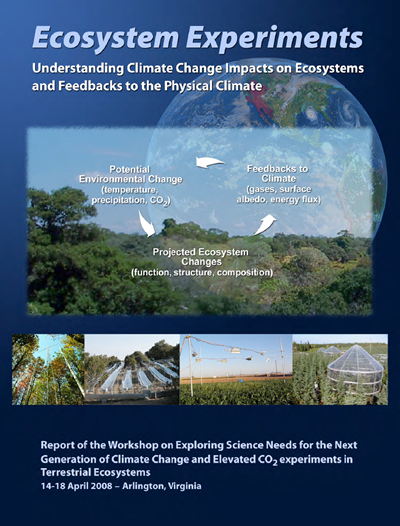Ecosystem Experiments: Understanding Climate Change Impacts on Ecosystems and Feedbacks to the Physical Climate Workshop Report
- Print Publication: June 2008
- Workshop Dates: April 14-18, 2008
- Report Download: Fast-download PDF
The dynamic, natural carbon cycle processes responsible for storing energy in the past are still functioning within today’s terrestrial ecosystems to sustain life on Earth through the production of food, fiber, biofuels, breathable air, and naturally purified water. Furthering our understanding of how terrestrial ecosystems will respond to future climatic and atmospheric change is an essential component of an integrated climate change research program. Terrestrial ecosystem research is critical for evaluating the net greenhouse gas balance between Earth’s surface and atmosphere, where it contributes to climatic change. Projections of ecosystem modifications associated with climate change are also necessary for the evaluation of mitigation and adaptation strategies by policymakers and society. This workshop explored science needs for the next generation of climate change and elevated-CO2 experiments in terrestrial ecosystems. The critical scientific needs surrounding two general questions were the focus:
- What are the key scientific uncertainties surrounding the combined impacts and feedbacks of warming and changes in moisture status, in combination with elevated CO2 concentration, on the functioning, structure, and composition of terrestrial ecosystems?
- What existing or new facilities and methods are needed to conduct long-term ecosystem-scale warming, precipitation, elevated-CO2, or multiple-factor manipulation experiments in the field?
This workshop was supported by the U.S. Department of Energy, Terrestrial Ecosystem Science program. Held in Arlington, Virginia, on April 14-18, 2008.
Suggested Citation: U.S. DOE. 2008. Ecosystem Experiments: Understanding Climate Change Impacts on Ecosystems and Feedbacks to the Physical Climate. U.S. Department of Energy Office of Science. ess.science.energy.gov

